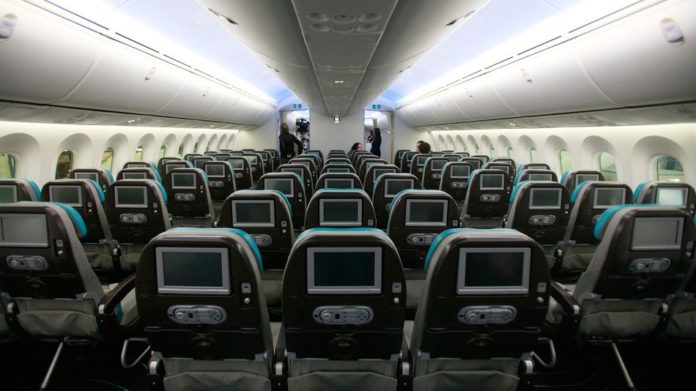Lawsuit alleges airplane cabin air caused flight attendant illness

Fumes in airplane cabin air could be hazardous for your health, according to a lawsuit filed Monday in Chicago.
The legal action is the latest to spark debate over supposed risks of cabin air to crew and frequent fliers. The issue has been coming up in several countries, including the U.S., UK and Australia, resulting in more than one lawsuit.
On Monday, four Alaska Airlines flight attendants filed suit against Chicago-based aircraft manufacturer Boeing in Cook County Circuit Court, according to the Chicago Tribune.
The flight attendants allege that on a flight from Boston to San Diego on July 12, 2013, the air drawn from the engine on their Boeing 737 was contaminated by harmful fumes. The attendants say the fumes led to vomiting, with three of them passing out. All were taken to a hospital in Chicago after the flight was diverted, and two did not return to work.
The lawsuit says that toxic air is Boeing’s “dirty little secret.” However, no aviation authorities or health officials have publicly supported the hypothesis that cabin air is dangerous, or officially acknowledged a diagnosis of “Aerotoxic Syndrome,” as it has been called.
“I don’t think the average flier should be afraid to fly,” industrial hygienist Judith Anderson, who researches health issues for the Association of Flight Attendants, told the Tribune. “I think the average flier should be aware of the potential for this to happen. And I think the manufacturers should be rethinking their systems and designing them in a way that won’t put people at risk.”
The plaintiffs’ attorneys call it poisoning, faulting Boeing for defective designs and for failing to warn about the alleged dangers of the air inside the cabin. Boeing is “knowingly endangering airplane passengers,” the Tribune quotes the lawsuit as saying.
There is also planned legal action in the UK, where 17 crew members — and possibly more — are preparing to pursue civil claims against various British airlines for exposure to toxic air.
A report from the UK Civil Aviation Authority (CAA) obtained by the BBC found 251 separate incidents of “fumes” or “smoke” inside large British passenger jets, resulting in 104 reports of illness.
However, CAA still found such incidents to be rare and found no evidence of negative long-term health effects.
In 2009, an expert panel at Australia’s Civil Aviation Safety Authority also reported on the problem.
“For more than twenty years, concerns have been expressed in reports from Australia and overseas about a possible relationship between exposure to fumes from heated engine and hydraulic oils contaminating air drawn into aircraft air conditioning systems in certain types of aircraft,” the panel wrote. “Although a number of inquiries have been undertaken, both in Australia and internationally, the results have been indeterminate, due in part to the difficulty in finding satisfactory evidence.”
The report continued: “The immediate effects of exposure to contaminated air have been well documented but debate continues about causation, diagnosis and treatment of long-term effects.”
A Boeing spokesperson said the company had no comment on the lawsuit.
Mashable has reached out to Alaska Airlines and will update with additional information as it becomes available.
Have something to add to this story? Share it in the comments.
